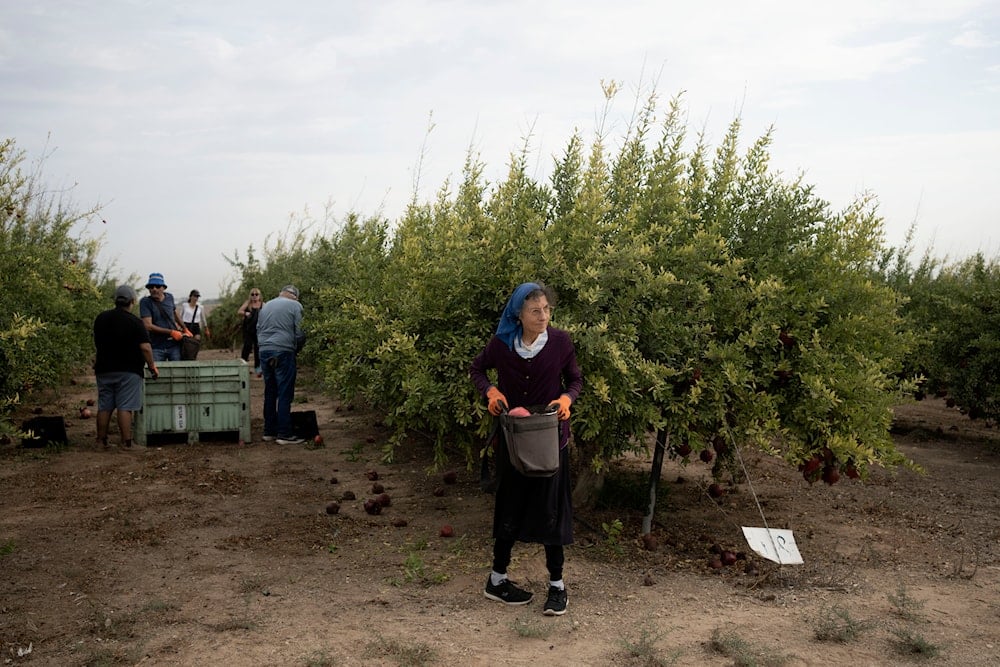Gaza, Lebanon devastating 'Israel's' agriculture sector
The wars that the Israeli occupation got itself into, whether in Lebanon or occupied Palestine, have caused irreparable damages, with its agriculture output falling by 80%.
-

Israeli settlers pick pomegranates on a farm in Askalan, occupied Palestine, October 27, 2023 (AP)
Operation al-Aqsa Flood and the subsequent war waged by the Israeli occupation on Gaza have inflicted severe damage on the Israeli occupation's agricultural sector, particularly in the southern and northern regions, which are crucial for fruit and vegetable production, leading to urgent financial needs for farmers and causing significant shortages and price increases in essential produce.
According to the Agriculture Ministry, the crisis afflicting the Israeli occupation's agriculture is the most severe workforce crisis since its occupation of Palestine.
The shortage stems from a combination of factors: many settlers have been called up for reserve service, others are too fearful to report to work, foreign workers have requested to return to their home countries, and workers from the occupied West Bank are under lockdown.
Prior to October 7, there were 29,900 foreign workers in Israeli agriculture, mostly from Thailand. Upon the beginning of hostilities, around 9,948 workers returned to their home country, and approximately 10,000 to 12,000 workers from the West Bank were unable to work, leading to a shortage of about 20,000 workers.
Back in January, the Israeli Yedioth Ahronoth newspaper said fear of Hezbollah's firepower has caused extensive financial damages to northern settlers, mainly to farmers, because they are unable to work on the farmland they had usurped from the people of northern Palestine and southern Lebanon. According to the Israeli outlet, the losses amount to 500 million shekels ($131 million).
"Farmers in the north complain of the difficulties to reach the farmland alongside the border area, with there being losses on two fronts: the unharvested fruits and the damages done to the next harvest season," the website said.
It also noted that no one has thus far contacted the northern farmers regarding any compensation scheme as their crops rot on the ground.
Yaron Belhassan, CEO of the Fruit Growers Organization in "Israel", told Ynet that extensive damages were done to the functional continuity of farming on the northern border, as the farmers cannot tend to their farmland and take care of their crops as part of the necessary preparations for the 2024 season.
Israeli Farmers Federation President Dubi Amitay called for not sowing any open area that is visible to the Lebanese side, adding that while the damages cannot be precisely assessed, it is estimated that the losses amount to 500 million shekels between al-Jalil and the occupied Syrian Golan.
Joseph Gitler, founder and chairman of Leket Israel, the Israeli occupation's Food Bank, noted that thousands of farmers had been impacted, particularly in northern occupied Palestine where it’s too dangerous for them to work in their fields due to bombardment from Lebanon. The production of fruits and vegetables has dropped by 80% in the months following the war.
To add to the woes faced by Israeli settlers, many farmers did not even receive government support as they face paramount financial burdens as their infrastructure is dealt blows from both Gaza and Lebanon, adding to the sense of abandonment northern settlers are experiencing.
No return to the north
The Israeli Globes website conducted a recent study in May involving 340 settlers who have evacuated the occupied north, examining the impact of the eviction months since the northern front was ignited.
The study's findings pained a "harsh image" of groups that are experiencing mental crises because they felt neglected and abandoned by the Israeli occupation. The sampled settlers also reported struggling to go back to ordinary life, according to the website.
Israeli professor Meirav Aharon-Gutman, who was leading the study, said the occupation government and military "did not work in accordance to their drawn plan, nor did they mobilize to find a solution," noting that settlers residing in northern border settlements, "the guardians of agriculture, nature, and the borders, felt that the evacuation ruined the basic nature of their lives."
Gutman added that the issue of education was more prominent than other problems stemming from the evacuation. She noted that parents have to enroll their children in school by the set deadline of September 1, but have no idea where to enroll them because many had to pause their education amid the evacuation.
She further stated that students who had graduated during the COVID-19 pandemic have no regard for the "idea of school", emphasizing that the younger generation does not have study habits, which keeps expanding the educational gap.

 5 Min Read
5 Min Read








